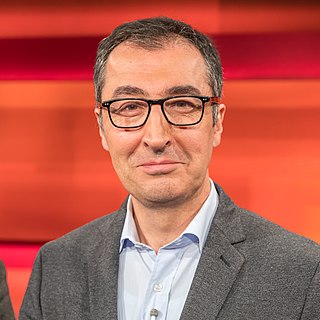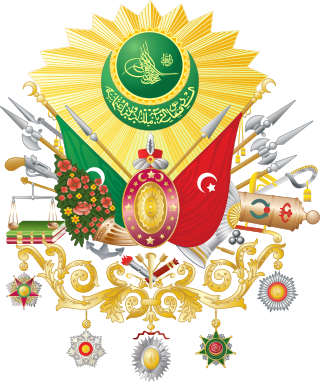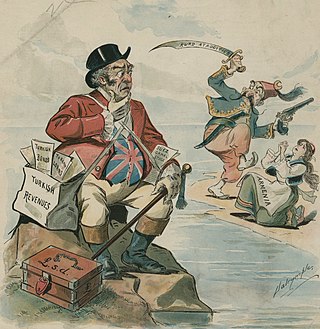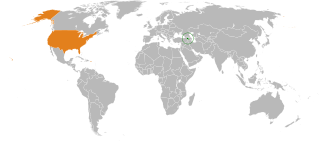| |||||
| Decades: | |||||
|---|---|---|---|---|---|
| See also: | Other events of 2006 List of years in Armenia | ||||
The following lists events that happened in 2006 in Armenia.
| |||||
| Decades: | |||||
|---|---|---|---|---|---|
| See also: | Other events of 2006 List of years in Armenia | ||||
The following lists events that happened in 2006 in Armenia.

Halil Turgut Özal was a prominent Turkish politician, bureaucrat, engineer and statesman who served as the 8th President of Turkey from 1989 to 1993. He previously served as the 26th Prime Minister of Turkey from 1983 to 1989 as the leader of the Motherland Party. He was the Deputy Prime Minister of Turkey in the military government of Bülend Ulusu between 1980 and 1982.

Cem Özdemir is a German politician who currently serves as Federal Minister of Food and Agriculture since 2021. He is a member of the Alliance 90/The Greens party.

The dissolution of the Ottoman Empire (1908–1922) was a period of history of the Ottoman Empire beginning with the Young Turk Revolution and ultimately ending with the empire's dissolution and the founding of the modern state of Turkey.

Diplomatic relations between Armenia and Turkey are officially non-existent and have historically been hostile. Whilst Turkey recognised Armenia shortly after the latter proclaimed independence in September 1991, the two countries have failed to establish diplomatic relations. In 1993, Turkey reacted to the war in Nagorno-Karabakh by closing its border with Armenia out of support for Azerbaijan.

Armenian genocide denial is the claim that the Ottoman Empire and its ruling party, the Committee of Union and Progress (CUP), did not commit genocide against its Armenian citizens during World War I—a crime documented in a large body of evidence and affirmed by the vast majority of scholars. The perpetrators denied the genocide as they carried it out, claiming that Armenians in the Ottoman Empire were resettled for military reasons, not exterminated. In the genocide's aftermath, incriminating documents were systematically destroyed, and denial has been the policy of every government of the Republic of Turkey, as of 2023, and later adopted by the Republic of Azerbaijan, as of 1991.

United Armenia, also known as Greater Armenia or Great Armenia, is an Armenian ethno-nationalist irredentist concept referring to areas within the traditional Armenian homeland—the Armenian Highland—which are currently or have historically been mostly populated by Armenians. The idea of what Armenians see as unification of their historical lands was prevalent throughout the 20th century and has been advocated by individuals, various organizations and institutions, including the nationalist parties Armenian Revolutionary Federation and Heritage, the ASALA and others.

The Armenian question was the debate following the Congress of Berlin in 1878 as to how the Armenians in the Ottoman Empire should be treated. The term became commonplace among diplomatic circles and in the popular press. In specific terms, the Armenian question refers to the protection and the freedoms of Armenians from their neighboring communities. The Armenian question explains the 40 years of Armenian–Ottoman history in the context of English, German, and Russian politics between 1877 and 1914. In 1915, the leadership of the Committee of Union and Progress, which controlled the Ottoman government, decided to end the Armenian question permanently by killing and expelling most Armenians from the empire, in the Armenian genocide.

Armenian genocide recognition is the formal acceptance of the fact that the Ottoman Empire's systematic massacres and forced deportation of Armenians from 1915 to 1923, both during and after the First World War, constituted genocide.

The dissolution of the Soviet Union in December 1991 brought an end to the Cold War and created an opportunity for establishing bilateral relations between the United States with Armenia and other post-Soviet states as they began a political and economic transformation. The United States recognized the independence of Armenia on 25 December 1991, and opened an embassy in Armenia's capital Yerevan in February 1992.
Events from the year 2007 in Armenia

Sebahat Tuncel is a Turkish politician of Kurdish origin, women's rights advocate, former nurse and member of the Parliament in Turkey. She was elected a member of parliament while being in prison.
The issue of Armenian genocide reparations derives from the Armenian genocide of 1915 committed by the Ottoman Empire. Such reparations might be of financial, estate or territorial nature, and could cover individual or collective claims as well as those by Armenia. The majority of scholars of international law agree that Turkey is the successor state or continuation of the Ottoman Empire. In addition, the Republic of Turkey continued the Ottoman Empire's internationally wrongful acts against Armenians, such as confiscation of Armenian properties and massacres. Former Secretary of the UN Human Rights Committee, Professor Alfred de Zayas, Geneva School of Diplomacy, stated that "[b]ecause of the continuing character of the crime of genocide in factual and legal terms, the remedy of restitution has not been foreclosed by the passage of time".

Armenian–Syrian relations are foreign relations between Armenia and Syria. Armenia has an embassy in Damascus and a consulate general in Aleppo. In 1997, Syria opened an embassy in Yerevan. Syrian Foreign Minister Farouk al-Sharaa visited Armenia in March 1992.

Foreign relations have reportedly always been strong between Armenia and Cyprus. Cyprus has been a supporter of Armenia in its struggle for the recognition of the Armenian genocide, economic stability and the resolution to the Nagorno-Karabakh conflict. In return Armenia has been advocating a stable Cyprus after the Turkish invasion in 1974 and supporting a lasting solution to the Cyprus dispute.

The political status of Nagorno-Karabakh remained unresolved from its declaration of independence on 10 December 1991 to its September 2023 collapse. During Soviet times, it had been an ethnic Armenian autonomous oblast of the Azerbaijan Soviet Socialist Republic. Following the dissolution of the Soviet Union, a conflict arose between local Armenians who sought to have Nagorno-Karabakh join Armenia and local Azerbaijanis who opposed this.
The following lists events that happened during 2014 in Armenia.

The Ottoman Empire was one of the Central Powers of World War I. It entered the war on 29 October 1914 with a small surprise attack on the Black Sea coast of Russia, which prompted Russia to declare war on 2 November 1914. Ottoman forces fought the Entente in the Balkans and the Middle Eastern theatre of World War I. The Ottoman Empire's defeat in the war in 1918 was crucial in the eventual dissolution of the empire in 1922.
The following is list of the official reactions to the Second Nagorno-Karabakh War.